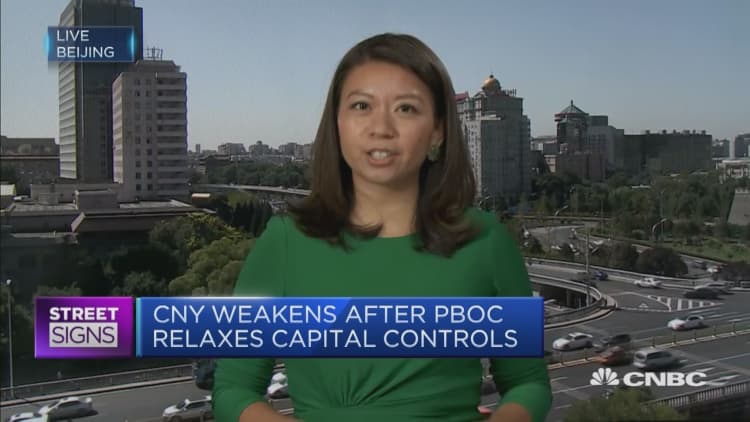
China's yuan weakened against the U.S. dollar on Monday after the government scrapped measures meant to prop up the currency.
The central bank removed reserve requirements for financial institutions settling currency forwards, and for foreign banks holding yuan deposits offshore, reversing actions put in place a few years ago to quash depreciation pressures.
The actions were always meant to be temporary and scaled back when the yuan regained firmer footing. But the currency's immediate market reaction to the rule unwinding is a reminder of how precarious Beijing's high-wire balancing act really is when it comes to the yuan.
"Policymakers have demonstrated that they have more control over the exchange rate in the short run than many people believed," wrote Mark Williams, chief Asia economist at Capital Economics, in a note. "But they still struggle to manage the expectations that determine medium-term exchange rate pressures."
That's because China is balancing a number of priorities when it comes to its currency, including engineering stability in the markets ahead of a major leadership shuffle next month.
A stronger yuan prompts investors to keep money onshore to chase returns at home. It also lets China defend against long-standing critics, including the U.S., that claim the world's second-largest economy purposefully keeps the value of the yuan low in order to get a leg up in global trade with cheaper exports.
The move is well-timed, as it comes ahead of an expected visit by U.S. President Donald Trump to China later this year, said Callum Henderson, managing director at political risk consultancy Eurasia Group. Trade tensions have been bubbling between the U.S. and China.
But the scales can tip easily the other way — a stronger yuan, coupled with waning demand, is already hurting trade activity. August exports were up 5.5 percent, posting weaker growth than the 7.2 percent increase seen in July.
On Tuesday, the government lowered its official yuan parity rate to 6.5277 per dollar, snapping an 11-day climb, supporting analyst calls that depreciation worries are subsiding.
Despite Monday's weakness, the yuan is still up 6.5 percent so far this year against the greenback, and holding onto its erasure of last year's losses.
All that "is a step towards convincing [the] market of increased two-way flexibility of the renminbi," said UBS China economist Wang Tao, using another name for the yuan.
"Policymakers will want to introduce more uncertainty about the outlook to prevent the re-emergence of a view that the currency will only move one way," wrote Williams.
Perception the yuan is a one-way bet complicates Beijing's calls over the last few years that it's loosening its grip on the currency as part of wider structural reforms to allow more of a role for open market forces.
Still, the central bank does maintain control with a diverse policy toolbox and its method of setting a midpoint rate for the yuan, which is allowed to trade within a 2 percent limit against the dollar each day.
For the short term, the "risk of major depreciation is limited in the run-up to the Party Congress," said MK Tang, a senior China economist at Goldman Sachs.
In the long run, analysts are saying the yuan has likely peaked, especially as uncertainty hangs over how the economy will fare as the year draws to a close.
"We do not see the currency embarking on a multi-year appreciation path," said Wang.
The primary cause of the yuan's tumble last year — interest among Chinese investors in diversifying into foreign assets for higher returns — hasn't gone away, she said.


